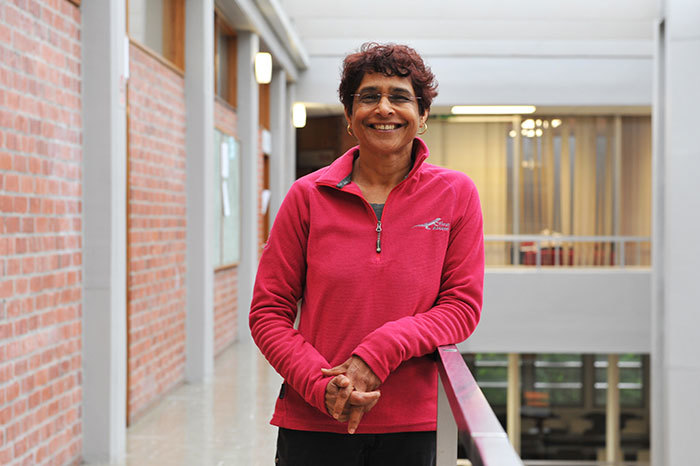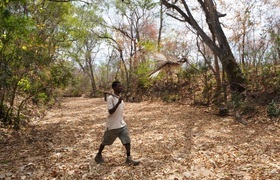'I suppose each generation has its own struggles'
15 June 2015 | Story by Newsroom
Dr Salma Ismail, senior lecturer in the School of Education, was a student at UCT in 1976. She remembers campus at the time as a place of heated debate, political activity and a lot of critical reading. She looks at the liberation struggle then and compares and contrasts it to this generation's struggles.
HS: Where were you in 1976?
SI: I was a student at UCT in 1976, on a permit, studying towards a BSc at first but later switched to a BA. There was no Academic Development Programme in those days. We were a small group of black students and we supported one another. It was an unwritten rule we didn't participate in sports or social events or graduation. It was a matter of principle.
We had our own debates on the grass patch in front of Jammie Steps – Freedom Square. People would be allowed to debate any topic, people from the far right to the far left. It would be a nice thing to initiate again. It [1976] was a bit of a surreal experience. There was a lot of activity on campus. There was a lot of reading, anything that was banned we tried to get our hands on.
In the 1970s Steve Biko was a strong influence. The critical reading at that time was Biko's I Write What I Like and Frantz Fanon's Black Skin, White Masks and The Wretched of the Earth. We also read a lot of literature about socialism – Karl Marx, Lenin, Trotsky, Rosa Luxemburg, Mao Tse-Tung and from Africa, Uhuru Kenyatta and Amilcar Cabral, as well as Castro and Che Guevara's lessons from the Cuban revolution.
I'm interested to see that has all come around again with the experiences of current students at UCT. Many of them have come out of a post-apartheid era; they didn't live through those times of conscientisation in the 70s and the 80s. Back then we had teachers giving us an alternative education, subversively, showing the other side of the curriculum. When I was a teacher in the 1980s, I role-modelled that in Bonteheuwel.
HS: Do students today know enough about that era?
SI: Students today learn about it through newspaper articles and TV, if they study history at school or from parents or the state's celebration programmes, but they're learning now with their own struggles as we see on campus and in NGOs like Equal Education and TAC. I suppose each generation has its own struggles. The big struggle was national liberation and there was huge debate about race and class and whether the struggle was about just race or race and class. It seems that now it's more about race. The students are still expressing their struggles in a racialised language and haven't found another language yet to put a new egalitarian vison forward for society. We were fighting for a non-racial, often socialist future. I don't see that debate here [at UCT]. We had powerful debates with the late Neville Alexander for a language that went beyond race and embraced a humanistic perspective.
HS: How do you remember 1976 and how did this watershed year affect developments in the 1980s when the Cape Flats erupted?
SI: Things were set off after protests against Afrikaans being made compulsory in the black schools. The impact of 1976 was critical as future student protests looked back to those years and built on those forms of protest action. The focus in the schools was about quality education – as it is today. For example in the 1980s I was a teacher in Bonteheuwel Senior Secondary School in an area where trade union movement was beginning as well as community organisations. This background and the rise of black consciousness movement spurred the 1980s school boycotts.
Back then the students really participated in an active liberation struggle: they changed their identities from being poor and marginalised and living in the shadows to being active in their communities, rallying support and fighting for a cause.
HS: What was it like living and working on the Cape Flats post-1976?
SI: There was a high level of trade union movement. The Fattis and Monis strike of 1979 coincided with high levels of school boycotts and community organisations, trade unions and student organisations worked together against government. In Bonteheuwel, where I was teaching, it affected a lot of the mothers who were textile workers. Afterwards the protests became less about the school and more about liberation. Coloured and black schools united under various bodies like the United Democratic Front.
And many youths were leaving the country for military training and then returning. The mood was quite different to 1976. And then in 1985 came the murder of the Cradock Four: Matthew Goniwe, Fort Calata, Sparrow Mkhonto and Sicelo Mhlauli, anti-apartheid activists assassinated by the South African Secret Police during the height of apartheid. People started mobilising to protest those murders and the youth developed radical slogans such as 'Liberation now! Education Later!' Under that banner students formed a big youth group, COSAS, of moderates and radicals and competing slogans, one led by the unity movement: 'Liberation through Education'.
'Liberation First, Education Later' was led by a more militant group. In Bonteheuwel there developed among the three high schools a student organisation called the Bonteheuwel Military Wing. They were involved in all the action at the schools from 1984 to 1987: disruptions to highlight that their education was a gutter education and that the struggle was linked to a wider liberation struggle. There would be street protests, sit-ins and marches. They'd identify targets and stone police vehicles and councillors' houses. And because we had the tripartite government, there was action against coloured leaders who'd joined the tripartite government and calls for boycotts of these elections.
Of course the police would follow with sjamboks and shoot rubber bullets. So there was a lot of anxiety and a lot of passion – and fun. There was the adventure of it. They learnt a lot and grew a lot because they were making their own decisions. They had to plan their own events and forms of disruption.
HS: How did this link up with broader national political activity?
SI: The ANC in exile had sent out a call to make the townships ungovernable and to make the schools ungovernable, so the school became the focal site of the struggle. Very little teaching took place and there was a whole movement not to write matric exams in 1985. At that time, the youth were very inspired and their calls for liberation were very passionate because they were seeing the effects of repression in their own townships.
Another major event was the joint resistance of student communities and teachers, and the Pollsmoor march led by Desmond Tutu and Allan Boesak. And then followed the closure of schools and the formation of the Western Cape Teachers' Union, other trade unions and the parent support groups. After the Trojan Horse incident in Athlone, the State of Emergency in 1985 and the army's occupation of some of the schools, as well as the detention of leadership at all levels, the street action dissipated into sporadic incidents and one last grand stand was when we went in hordes to take over the whites-only beaches – but gradually protest action decreased. And then of course at the beginning of the 90s there was all the excitement about the unbanning of the ANC and the release of Mandela.
HS: What happened to this generation?
SI: It was hard to be their parents. You never knew where your child was, where they were sleeping. Were they safe? Had they been arrested? Many were arrested and tortured. Three of the Bonteheuwel Military Wing – Ashley Kriel, Anton Fransch and Gori November – left the country. When Kriel and Fransch returned, they were both killed, as were Coline Williams and Robbie Waterwitch. The BMW split and became part of an underground organisation linked to Umkhonto we Sizwe. The SRCs were more linked to the ANC leaders in the UDF. They lost control over the BMW. The BMW had initiated their own plans of action involving a lot of ungovernability and disruption. A lot of people had infiltrated the BMW – they weren't sure who they could trust and who they couldn't. Even primary school kids had joined up for the adventure. They were all arrested sleeping in a bus outside a shopping centre.
Many of them had seen the gangsterism and drugs in their communities, so for them they also saw the fight for liberation as a way of escaping those conditions, which unfortunately didn't happen after liberation. Quite a few became unemployed and lost out on education and skills – even those who did manage to get some education.
When the Truth and Reconciliation Commission came, some testified. But they felt the TRC saw them as victims and perpetrators and their testimonies were seen as individual testimonies whereas for them they were a collective. They also felt after the TRC process there was nothing for them; no remuneration, no-one opened a school for them, no-one directed them into what they could do with their lives. And they felt they'd learnt a lot of skills in the struggle. Many are now part of the Umkhonto we Sizwe Military Veteran's Association led by activist Shirley Gunn and still appealing for money and for jobs. Some of the struggle veterans remain adrift, finding little place or purpose.
Quite a few felt they could not join the SANDF after liberation because they couldn't serve alongside people they'd fought against. Some found good positions in community organisations; they had organisational skills, they could plan programmes. However, many believe that their fight has not ended. There's a nice quote they use: 'The end of the struggle is when the hungry are fed'.
HS: Are there lessons or parallels for today's youth?
SI: Today we have a democratically elected government and the youth protests and struggles in schools are more issue-based. For example with Equal Education the struggle started with getting a library into each school and now it's unfolded to developing norms and standards for each school and holding the government accountable. So that is good. Often the protests go beyond the schools to other critical social justice debates on policing and also joining the Right2Know campaign – it is more about protecting civil rights, holding the state accountable, being critical – all of which is also important for this moment in our history. Currently there is also a lot of emphasis on building youth leadership skills.
Interview by Helen Swingler. Photo by Michael Hammond.
Return to 1976 – lost and found main story
 This work is licensed under a Creative Commons Attribution-NoDerivatives 4.0 International License.
This work is licensed under a Creative Commons Attribution-NoDerivatives 4.0 International License.
Please view the republishing articles page for more information.










